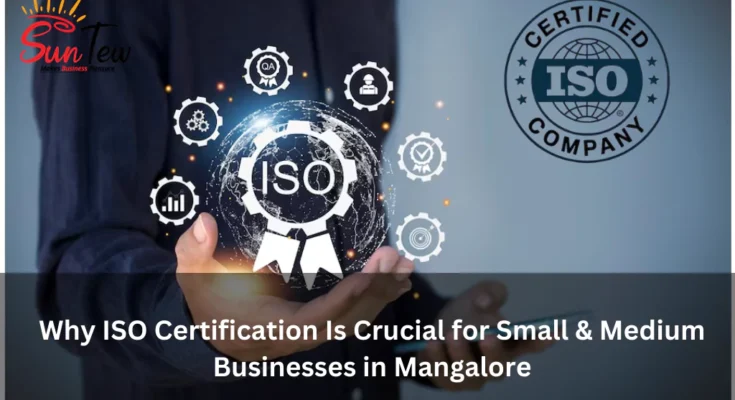If you are a Mangalore business owner, you have probably heard about ISO certification and its advantages for your enterprise. But do small and medium-sized businesses (SMEs) need it? The simplest response is “yes.” Even if you’re not a big business, an internationally recognized ISO certification, like ISO 9001 (Quality Management System) or ISO 14001 (Environmental Management System), may greatly increase credibility, streamline procedures, and open up new prospects. In addition to outlining the fundamental procedures for getting started, this blog article will examine the main arguments for why ISO certification is essential for SMEs in Mangalore.
Key Benefits of ISO Certification for Mangalore SMEs
1 .Augmented Credibility and Trustworthiness
ISO standards are recognised worldwide for their strict guidelines on quality and consistency. For instance, the ISO 9001 seal immediately tells customers and partners in Mangalore—and beyond—that you adhere to global quality standards. This trust factor can help you stand out in a crowded local market.
2.Improved Operational Efficiency
ISO certification requires documenting, measuring, and optimising your business processes. Whether it’s inventory management or customer service, these standardised practices often lead to reduced errors, lower costs, and higher productivity—vital for the growth of small and medium businesses.
3. Competitive Advantage
Mangalore’s economy is rapidly expanding, drawing local entrepreneurs and outside investors. An ISO certification can position your SME as a high-quality provider, giving you an edge over competitors who may not meet the same standards.
4. Easier Market Expansion
Are you planning to expand beyond Mangalore to other regions or export internationally? Many government tenders and international contracts require ISO compliance. ISO-certified can significantly streamline the process when seeking larger contracts or exploring export opportunities.
The ISO Certification Process: A Quick Overview
- Gap Analysis & Planning
- Start by comparing your current practices with the specific ISO standard requirements.
- Identify gaps in documentation, training, or process consistency.
- Documentation & Implementation
- Develop procedures and policies to meet the ISO criteria.
- Train your staff on these new protocols and ensure they understand the objectives.
- Internal Audit
- Conduct an in-house audit to check whether your processes comply with ISO standards.
- Document any non-conformities and resolve them before the official audit.
- Certification Audit
- Hire an accredited external certification body.
- They’ll review your procedures, interview employees, and inspect records to confirm compliance.
- Certification & Ongoing Compliance
- After a successful audit, you’ll receive your ISO certificate.
- Ongoing compliance is key; most ISO certifications require periodic surveillance audits.
Common Pitfalls & FAQs
Pitafalls 1 : Focusing Only on Documentation
It’s not just about paperwork. ISO standards aim for consistent quality. Implement the processes genuinely rather than treating them as a box-ticking exercise. This genuine commitment to quality will make your business stand out, and your customers feel valued.
Pitfall 2: Underestimating Employee Training
If your staff isn’t on board, new systems won’t stick. Provide regular training to ensure everyone understands how and why these changes matter
FAQ
1 )Can small businesses in Mangalore afford ISO certification?
Yes, ISO certification is accessible to businesses of all sizes. While the initial investment is required, the long-term benefits, such as improved efficiency and market competitiveness, often outweigh the costs
2)What happens after obtaining ISO certification?
After certification, your organization must maintain compliance through regular internal audits and address any non-conformities. Certification bodies may conduct surveillance audits to ensure ongoing adherence to ISO standards.
3)Is ISO certification a one-time process, or does it require renewal?
ISO certification is not a one-time process. It requires ongoing compliance, with surveillance audits typically conducted annually. After a certain period, usually three years, a recertification audit is necessary to maintain the certification status.
4)How Long Does the Certification Process Take?
For small and medium businesses, the time can range from 3 to 6 months, depending on their starting point and resource availability.
5)Is ISO 9001 the Only Certification Worth Getting?
Not necessarily. ISO 14001 (Environmental Management), ISO 45001 (Occupational Health & Safety), and ISO 27001 (Information Security) can also be beneficial, depending on your industry.
Conclusion
ISO certification isn’t just for large multinational corporations. For SMEs in Mangalore, it can be the game-changer that establishes credibility, attracts high-quality contracts, and fosters long-term growth. From increasing customer trust to optimising business operations, the benefits are worth the initial investment of time and resources.
Ready to Begin Your ISO Journey?
Suppose you’re considering ISO certification for your business in Mangalore. We can help you assess your current processes, implement the required standards, and navigate the certification audit. Contact us today to schedule a consultation and take the first step toward a more efficient, globally recognised operation.



